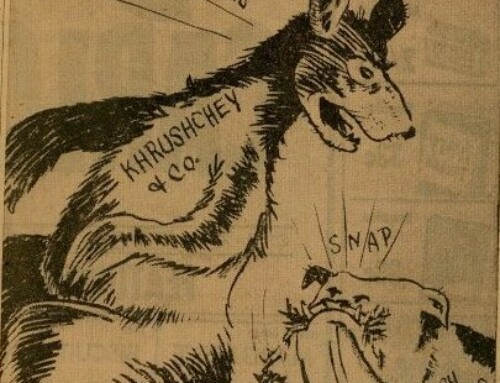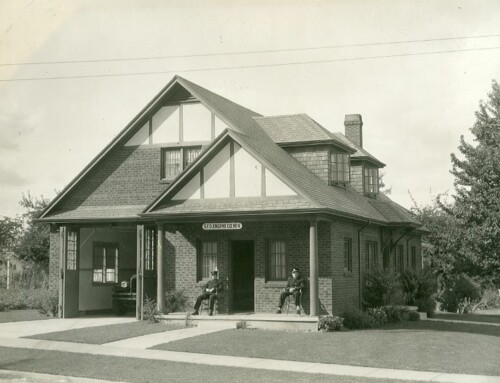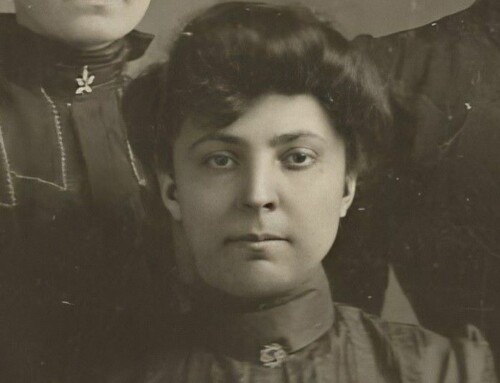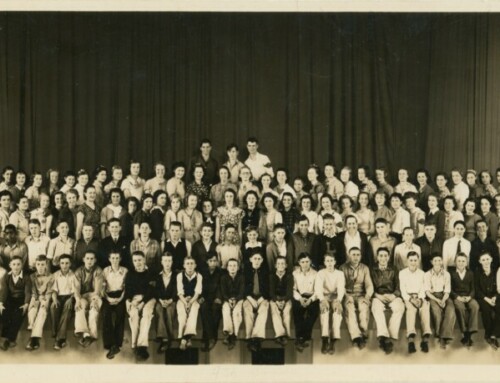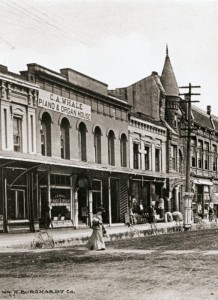
C.A. Whale Piano and Organ House on Commercial St. circa 1902-1905. Willamette Heritage Center 2017.028.0001
We have learned here in the research library at the Willamette Heritage Center that when a name comes across your desk so to speak, multiple times in the course of a week, you should sit up and take notice. This was the case with Mr. C.A. Whale. First came a research request seeking help delving into the history of the Santiam Canyon area. As we pulled records to help in the search, a book on local mining history made mention of Mr. Whale and his connection to the Capital mine up the little North Fork as well as a smelter later built in Salem.
The second time his name surfaced was in conjunction with a history assignment given to our teen interpreters to search old newspapers online for the history of past eclipses, viewable in Oregon. They came across the story of a racehorse named Oregon Eclipse. The name C.A. Whale surfaced again. This time related to a court case with the wife of a former business partner, alleging that he had recently purchased the thoroughbred. This was later proved false, he was not one of the owners of the Oregon Eclipse though he had bought interest in another local racehorse.
The third time the name C.A. Whale came across our desk, figuratively speaking, was in an historic photograph donated to the museum. The scene pictured is Commercial Street, sometime between 1902-1905 with a building sign clearly visible, “C.A. Whale Piano and Organ House.” Clearly this gentleman wanted his story told, but who was this mystery man with such diverse interests – mining, racehorses, and pianos?
Born in the Stockton area of California in 1857 to Charles Frederick Whale and Sarah Louise Thompson, C. A. or Charles Alfred was one of six children. His father was the designer and builder responsible for the completion of Copperopolis Railroad which linked Stockton to Farmington and Milton, California. We follow Charles through the California Great Registers until 1880 and next pick up his trail in Salem, Oregon in 1884 where he marries Annie B. McClure in the Chemeketa Hotel on Valentines Day. The couple would have only one child, daughter Louise Idella born 1892. Based on historic newspaper accounts, from 1884 on his business and fortune seemed tied to the Willamette Valley.
His mining interests up the Santiam Canyon develop alongside a partnership with William Galliher to run a piano and organ store on the corner of State and Commercial St. where Pioneer Trust Bank is now located. From 1888-1902 C.A. would have a series of piano store partners coming and going, and a trail of court cases that followed as they sought the compensation due them. From the beginning, Mr. Whale had an arrangement with the Gilbert Brothers to furnish the store with pianos and organs. They provided the instruments, along with freight and delivery in return for a commission based on the final sale price of the items. Whale would in turn offer the pianos and organs on an installment plan to his customers, often at double the price of what Gilbert Brothers charged him. Two problems developed. The first was that Whale was a bit loose with the facts as to what the final sale price was. The second was that if a customer defaulted on paying for an instrument, Whale would report it as unsold despite the fact that he would bring it back to the sales floor and re-sell it at a lower price. Either way, Gilbert Brothers was on the losing end of that particular agreement. They sued and the case continued all the way up to the state Supreme Court before settlement in their favor.
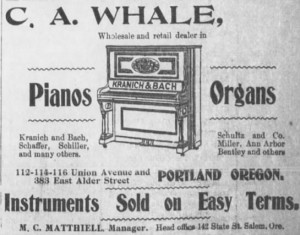
Advertisement for C.A. Whale Piano and Organ store in Portland. Credit: The Morning Astorian
One of Whale’s more unusual instruments on the showroom floor were electric pianos. The pianos operated off an electric motor which moved a reel of perforated paper. The holes in the paper operated the keys. The novelty pianos sold for $750 at the turn of the century. In an effort to showcase this unusual instrument and drum up business, Whale sponsored a demonstration at the Oregon State Fair. The performer was Charley Sauver, talented pianist by night and insurance salesman by day. During his performance, the pavilion plunged into darkness for a moment as an interruption occurred in electrical service. Sauver reached for the light nearest him and in an attempt to fix it was electrocuted. They carried him out limp and lifeless. Not the brilliant testimonial and demonstration that Whale had hoped for his electric pianos.
The trail of our mystery man begins to grow cold after the death of his wife Annie which was a terrible tragedy at the time. A couple of blocks away from Whale’s piano store she climbed aboard a crowded Portland Railway, Light & Power Co. streetcar bound for the fairgrounds. Witnesses were unclear at first as to how the accident happened. Some thought she dropped her pocket book and reached down, some thought that she fainted, others thought that a jolt from the car bumping one of many ruts in the street threw her off. Either way, she fell from the car into the street. She was taken to Salem Hospital unconscious, with a dislocated shoulder. She died a few hours later never having regained consciousness.
This was a terrible blow to Whale and his 15-year-old daughter. He sued Portland Railway, Light & Power and won a settlement of $7500. His wife was buried in City View Cemetery initially, then he had her body moved and reinterred in his family cemetery in Stockton, California. After that we lose his trail completely.
This article was written by Kaylyn F. Mabey for the Statesman Journal where it was printed 18 June 2017. It is reproduced here with sources for reference purposes.
Sources:
- 1860-1900 U.S. Federal Census Records
- California Voter Registers, 1866-1898
- Marion County Oregon Census 1895
- Marion County Oregon Marriage Records 1849-1900
- City Directories 1822-1910
- Oregon Death Index
- Find-a-Grave Memorial website
- Birth announcement of daughter – Weekly Oregon Statesman (Salem, OR), July 29, 1892, p. 6
- “Mrs. C.A. Whale Falls Off Car” Daily Capital Journal (Salem, OR), September 16, 1909, p. 5
- “Falls Off Car Woman Killed” Statesman Journal (Salem, OR), September 17, 1909
- “Whale Death Cause of Suit” Statesman Journal (Salem, OR), December 4, 1909, p. 1
- “Whale Loses Appeal” Daily Capital Journal (Salem, OR), December 8, 1902, p. 4
- “Gilbert Bros Bank Assets” Daily Capital Journal (Salem, OR), February 13, 1902, p. 2
- “Hold No Inquest Over Mrs. Whale” Statesman Journal (Salem, OR), September 18, 1909, p. 8
- “A Restraining Order – Issued by Judge Burnett in Chambers Yesterday” Statesman Journal (Salem, OR), August 7, 1900, p. 7
- “The New Smelter” Statesman Journal (Salem, OR), April 11, 1901, p. 5
- Ad for piano store – The Morning Astorian (Astoria, OR), October 19, 1899, p. 4 & December 5, 1899, p. 3
- “An Electric Piano” Statesman Journal (Salem, OR), August 5, 1899, p. 8
- “Dissolution of Partnership” Daily Capital Journal (Salem, OR), January 3, 1899, p. 1
- “The Salem Agent” Statesman Journal (Salem, OR), May 11, 1892, p. 4
- “Withdrawn (dissolution of partnership with Galliher) Statesman Journal (Salem, OR), March 19, 1890, p. 2
- “Strike in the Santiam” Statesman Journal (Salem, OR), July 24, 1888, p. 3
- “From the Mines” Statesman Journal (Salem, OR), July 25, 1888, p. 3



